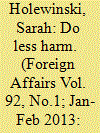| Srl | Item |
| 1 |
ID:
116103


|
|
|
|
|
| Publication |
2013.
|
| Summary/Abstract |
Everyone knows that civilians suffer in war. Even in lawfully conducted conflicts waged for legitimate causes, they lose lives, limbs, and loved ones. What fewer understand is that there are no laws that oblige warring parties to help the civilians they've harmed, as long as the action that caused the harm is considered legal. A fighter jet can strike a weapons cache next to a home, a guard can shoot a suspicious biker at a checkpoint, and a convoy can speed through a playground, but so long as in each instance the armed forces follow the Geneva Conventions' rules of discrimination and proportionality, they never have to explain, apologize, or pay for those losses.
|
|
|
|
|
|
|
|
|
|
|
|
|
|
|
|
| 2 |
ID:
147910


|
|
|
|
|
| Summary/Abstract |
What explains armed-group conduct toward civilians in war? The National Resistance Army (NRA) of Uganda demonstrated notable restraint toward civilians during its wars in northern Uganda in the 1980s, restraint that is puzzling given the overdetermined predictions for mass atrocity under rationalist, identity, and regime-type theories. Instead, the NRA case demonstrates that military culture—the organizational norms underlying combatant socialization—is a primary determinant of armed-group behavior, influencing combatant conduct in ways not conceptualized under existing theories of victimization. This review of the NRA case, based on field interviews with Ugandan military officers and examinations of Ugandan documentary archives, reveals three key points regarding the role of military culture in effecting restraint. First, the NRA case shows that organizational factors like military culture can determine military behavior toward civilians. Second, it reveals that theories of military culture, incorporating both formal and informal mechanisms of combatant socialization, can provide a more complete theoretical account than existing theories of armed-group conduct. Finally, the NRA provides potential hypotheses for mechanisms through which culture influences military behavior. I analyze the effect of culture on the NRA's conduct as a plausibility probe, generating inductive insights drawn from detailed field research to shed light on the organizational drivers of armed-group restraint. The NRA case thus points the way to a reconceptualization of military culture and the role of organizational factors that influence conflict behavior.
|
|
|
|
|
|
|
|
|
|
|
|
|
|
|
|